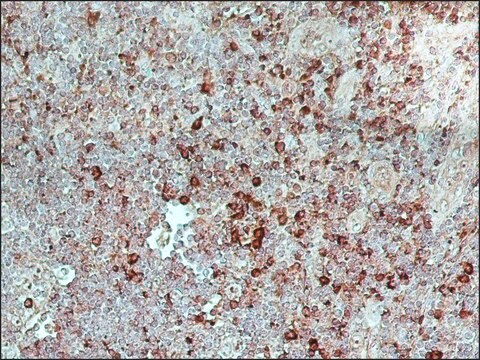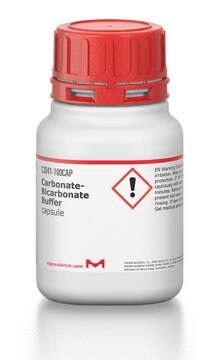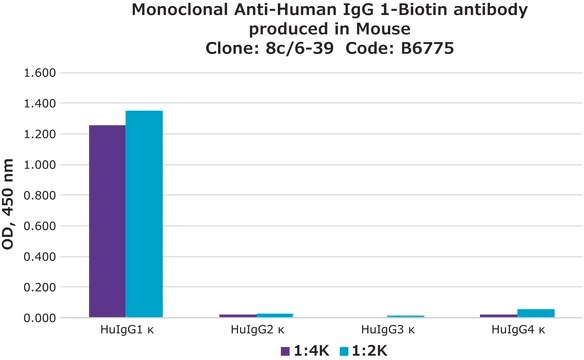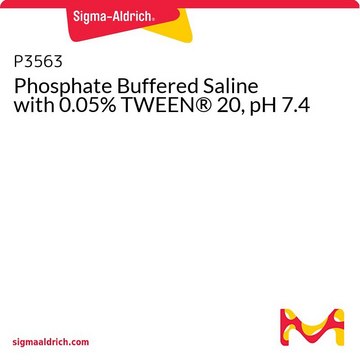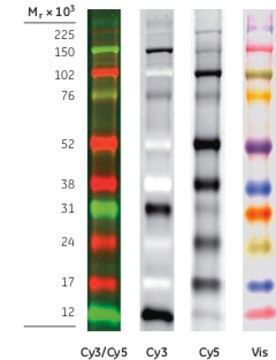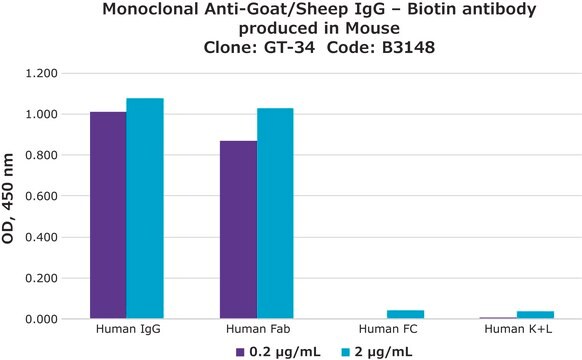B7014
Anti-Goat IgG (whole molecule)–Biotin antibody produced in rabbit
affinity isolated antibody, buffered aqueous solution
Iniciar sesiónpara Ver la Fijación de precios por contrato y de la organización
Seleccione un Tamaño
Seleccione un Tamaño
Cambiar Vistas
About This Item
Productos recomendados
biological source
rabbit
Quality Level
conjugate
biotin conjugate
antibody form
affinity isolated antibody
antibody product type
secondary antibodies
clone
polyclonal
form
buffered aqueous solution
technique(s)
direct ELISA: 1:20,000
storage temp.
−20°C
target post-translational modification
unmodified
¿Está buscando productos similares? Visita Guía de comparación de productos
General description
An immunoglobulin has two heavy chain and two light chain connected by disulfide bond. It is a glycoprotein. IgG is a major class of immunoglobulin. Goat IgG has two subclasses- IgG1 and IgG2.
Goat IgG is often used for the detection and study of various proteins such as EPAS1 and MIP-3 α among several others. Anti-goat IgG (whole molecule)-Biotin antibody can be used as a secondary antibody to facilitate the detection of such target proteins bound to goat IgGs by immunological assays . Thus, anti-goat IgGs are useful tools for the analysis of target proteins. Anti-Goat IgG (whole molecule)-Biotin antibody is specific for IgG in goats.
Immunogen
Goat IgG
Application
Anti-Goat IgG (whole molecule)-Biotin antibody produced in rabbit has been used:
- immunohistochemistry
- immunostaining
- western blot
- immunofluorescence
- immunohistochemical studies
Biochem/physiol Actions
Immunoglobulin G (IgG) participates in hypersensitivity type II and type III. It mainly helps in immune defense.
Physical form
Solution in 0.01 M phosphate buffered saline, pH 7.4, containing 1% bovine serum albumin and 15 mM sodium azide
Disclaimer
Unless otherwise stated in our catalog or other company documentation accompanying the product(s), our products are intended for research use only and are not to be used for any other purpose, which includes but is not limited to, unauthorized commercial uses, in vitro diagnostic uses, ex vivo or in vivo therapeutic uses or any type of consumption or application to humans or animals.
¿No encuentra el producto adecuado?
Pruebe nuestro Herramienta de selección de productos.
Storage Class
10 - Combustible liquids
wgk_germany
nwg
Elija entre una de las versiones más recientes:
¿Ya tiene este producto?
Encuentre la documentación para los productos que ha comprado recientemente en la Biblioteca de documentos.
Diana Borenshtein et al.
Genome biology, 9(8), R122-R122 (2008-08-06)
Comparative characterization of genome-wide transcriptional changes during infection can help elucidate the mechanisms underlying host susceptibility. In this study, transcriptional profiling of the mouse colon was carried out in two cognate lines of mice that differ in their response to
Monoclonal Antibodies: Principles and Practice (1996)
Patrick Pollard et al.
The Journal of pathology, 205(1), 41-49 (2004-12-09)
The Mendelian tumour syndromes hereditary leiomyomatosis and renal cell cancer (HLRCC) and hereditary paragangliomatosis with phaeochromocytomas (HPGL) result from mutations in nuclear genes (FH and SDHB/C/D, respectively) that encode Krebs cycle enzymes. HPGL tumours are highly vascular and there is
J F Parkinson et al.
The Journal of biological chemistry, 265(21), 12602-12610 (1990-07-25)
Thrombomodulin is an endothelial cell membrane protein which plays a central regulatory role in the protein C anticoagulant pathway. The human thrombomodulin intronless gene was isolated from a genomic DNA library and used to isolate the coding region. A mammalian
Molecular Genetics of Immunoglobulin, 17 (1987)
Nuestro equipo de científicos tiene experiencia en todas las áreas de investigación: Ciencias de la vida, Ciencia de los materiales, Síntesis química, Cromatografía, Analítica y muchas otras.
Póngase en contacto con el Servicio técnico